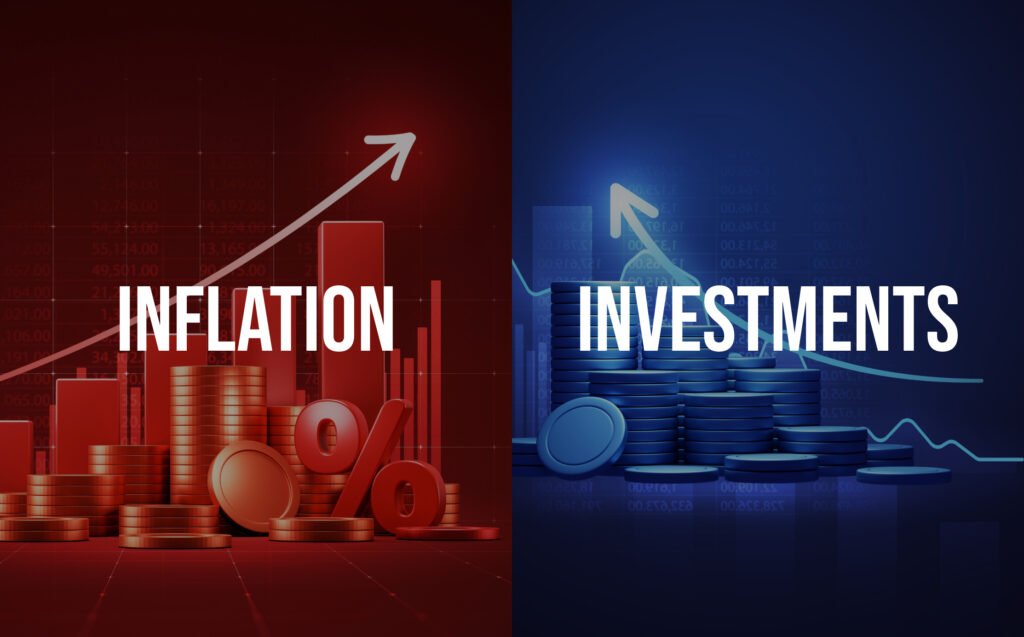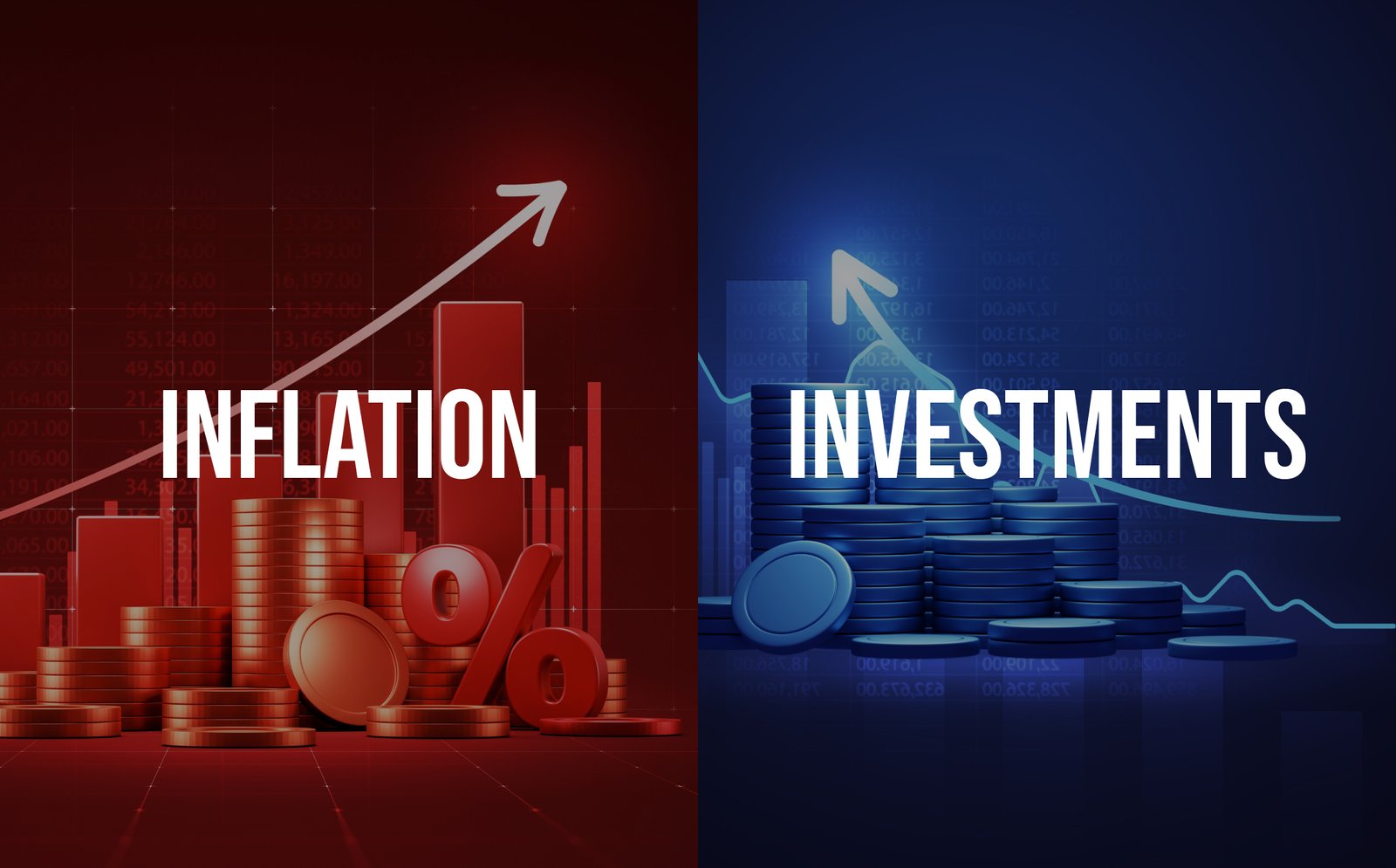
Inflation, the general increase in prices and fall in purchasing power of money, is on the rise.
In this ‘Inflation and Investments’ episode, Nkechi Amangbo explains the basics of inflation, understanding inflation, what investors need to know about investments and inflation, what investors can do to combat inflation and how Moneda helps investors retain value in their investments.
- Inflation devalues cash and has a negative effect on the returns of equities and bonds.
- Inflation measures the change in price of everyday goods and services.
- Investing in high-quality companies selling essential goods and services as well as buying safer government bonds is a solid strategy in inflationary environment.
- Inflation occurs when the supply of money increases relative to the level of productive output in the economy.
Globally, we have all seen that the cost of everyday goods and services have been on the rise over the last 5 years. Since the covid-19 pandemic, prices have been on a steady rise. The crisis between Ukraine and Russia has also disrupted supply chains and energy provisions, causing every country that is dependent on them to seek alternatives, leading to an increase in food prices, fuel, and other services.
This phenomenon is known as inflation.
Understanding Inflation
The easiest way to understand inflation is with an example. Suppose that you can buy a tuber of yam today for N1,000 and the yearly inflation rate is 20%, it means that the same tuber of yam will cost 20% more or N1,200 the following year. This instantly shows that you will need additional N200 to eat the same tuber of yam the following year.
Unfortunately, income does not increase at the same pace as inflation. Hence, the purchasing power of an individual reduces over time. Using the yam illustration above, suppose that Alfred earns N1,200,000 annually and eats 1 tuber of yam weekly, it means that he will need to spend N52,000 on yams in the first year but N62,400 in year 2 on the same salary. He will lose N10,400 to price change due to inflation.
Please note that a rise in the price of only one product is not in itself inflation but may just be a relative price change reflecting a decrease in supply for that product. In economics, inflation is about money growth, and it is a reflection of too much money chasing too few products.
What investors should know about their investments and inflation
Know your risk tolerance level:
Knowing your risk tolerance is a critical factor in the building of long-term investment success. Investors are advised to set personal goals as this will go a long way towards determining the level of risk that they are willing – and able – to take.
For instance, an older investor will be more concerned about wealth preservation and will place more value on stability. Hence, the older investor will look for investments that offer stability and preservation. It is mostly vice versa for a young investor who has a higher list of expenses. This investor needs more income generation and is more inclined to taking higher risks because returns have a direct relationship with the risk taken.
In a nutshell, your risk tolerance will affect the type of assets you own and, ultimately, the shape of your portfolio.
Learn how inflation affects asset classes e.g. equities and fixed income securities:
Equities
When investors make equity investments, they become shareholders and own a portion of a company’s assets and are entitled to earnings in the form of dividends. The performance of the company determines its worth (the value of its stock).
When wages are high and the underlying economy is strong, consumers can afford to buy a company’s products & services. Rising profits benefit shareholders because they will see a greater return on their investment. However, when wages aren’t rising and the economy is weak, consumers can’t afford to buy goods and services. This leads to a fall in both demand and company profits which adversely affects returns to shareholders.
Fixed Income Securities
The most significant fixed instruments are bonds. Investing in bonds simply means lending money to a big company or the government for a period in exchange for a fixed return. In this case, an investor’s expected return is fixed, but inflation is not and can devalue this fixed return.
If, for example, you buy a government bond for N1,000 that pays 6% interest, but inflation is 12%, then the value of the investment will fall. When the government repays the loan at the end of the fixed period, your original N1,000 will have been devalued by inflation.
Learn how investment affects cash and savings:
We have established that inflation devalues cash using the yam tuber illustrations above. Let’s bring it to savings.
Most people save their monies in banks but do not realize that banks do not pay interest rates that are higher than or even close to inflation. For instance, in Nigeria today, Naira savings account interest rates are between 1% to 3%, fixed deposit rates are between 6% to 10%p.a. and USD rates are between 1.75% to 4%p.a. depending on the bank while inflation was last pegged by the National Bureau of Statistics at 27.33% in October 2023.
Instantly, you see that the return on investment does not come close to the rate of inflation.
Banks do raise their interest rates to encourage savings over borrowing or spending. Unfortunately, banks won’t raise their interest rates above inflation, so the real interest rate you’re exposed to – the nominal rate offered by your bank minus inflation – will always be negative. For example, your bank pays you 10% interest on your savings, but inflation is 27.33%. So, the real interest rate for your savings is -17.33%, which means your purchasing power will decrease by 17.33% per year.
So, in periods of high inflation, it really isn’t worth holding cash. The returns on other investments such as short-term lending, stocks and bonds, however, can outpace inflation. Investing in these assets can generate significant wealth in the long term, so they should be seen as a viable alternative to holding cash.
What can investors do?
A little inflation doesn’t hurt but can drive wage increases and even stimulate growth if the underlying economy is strong. However, if inflation remains high for longer periods, people’s savings devalue and their purchasing power decreases.
Investing in high-quality companies selling essential goods and services – as well as buying safer government bonds – is usually a solid strategy in inflationary environments because these traditional investments should deliver better returns than cash.
How does Moneda help investors?
By operating in a niche market deploying world class risk management techniques, Moneda invests in tangible goods and services which have proven to be the best tools to combat inflation.
We offer returns that outpace inflation and significantly improve and preserve the purchasing power of our investors.
We have a range of products that investors can choose from and offer bespoke services to create products that suit the specific needs of our investors.
Our lowest rate on Naira investments is 15%p.a. and 11%p.a. on US Dollar investments. See link to our products here.
Contact us on treasury@monedainvest.com and let us start a conversation today.
Disclaimer: The information contained in this article is intended for general informational purposes only and should not be construed as personal financial advice. The opinions expressed herein are solely those of the author and do not necessarily reflect the views of any other individual or organization. The author of this article makes no warranties or guarantees regarding the accuracy or completeness of the information provided. The author will not be held liable for any losses or damages resulting from the use of this information. By accessing this article, you acknowledge and agree to the terms of this disclaimer.

Leave a Reply